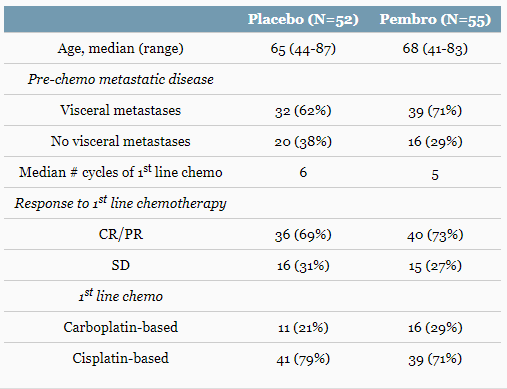Background:
Platinum-based chemotherapy for 1st-line treatment of pts with metastatic urothelial cancer (mUC) is typically administered for a fixed duration followed by observation until recurrence. PD-1 blockade with pembro improves survival of pts with mUC progressing despite platinum-based chemotherapy. We explored the potential benefit of earlier use of PD-1 blockade using a “switch maintenance” approach.
Methods:
Pts with mUC achieving at least stable disease after up to 8 cycles of 1st-line platinum-based chemotherapy were enrolled. Pts were randomized 1:1 to pembro 200 mg IV q3 weeks versus placebo for up to 24 months; pts progressing on placebo could cross over to pembro. Randomization was stratified based on pre-chemotherapy visceral metastases (Y/N) and response to 1st-line chemotherapy (CR/PR vs. SD). The primary objective was to determine the progression-free survival (PFS) as per irRECIST among pts treated with pembro versus placebo.
Results:
Between 12/2015 and 11/2018, 107 pts were randomized to placebo (n=52) versus pembro (n=55). The baseline pt characteristics are shown in the Table. Pts randomized to placebo and pembro received a median of 6 and 8 cycles, respectively. Excluding patients with baseline CRs, the objective response rate was 12% (5/42) on placebo and 22% (10/46) on pembro. Grade 3-4 treatment emergent adverse events occurred in 48% of pts on placebo and 56% on pembro. At a median follow-up of 14.7 months, 41 pts have died and 26/52 pts randomized to placebo have crossed over to pembro. PFS was significantly longer in patients randomized to pembro vs. placebo (Maximum Efficiency Robust Test p=0.036; log-rank p = 0.038). The 18-month restricted mean progression-free survival time was 5.6 months with placebo and 8.2 months with pembro (p=0.023).
Conclusions:
Switch maintenance pembro may “deepen” responses achieved with 1st-line chemotherapy. Switch maintenance pembro prolongs PFS in pts with mUC completing 1st-line platinum-based chemotherapy. Clinical trial information: NCT02500121.
Baseline Characteristics
